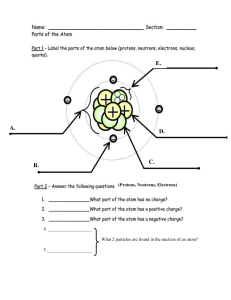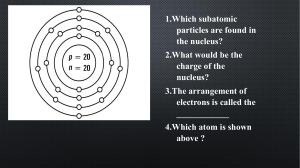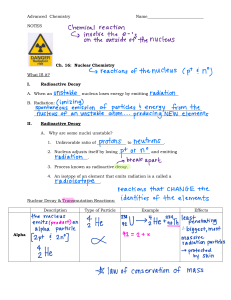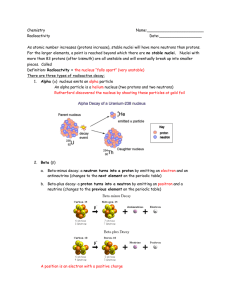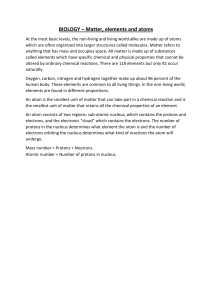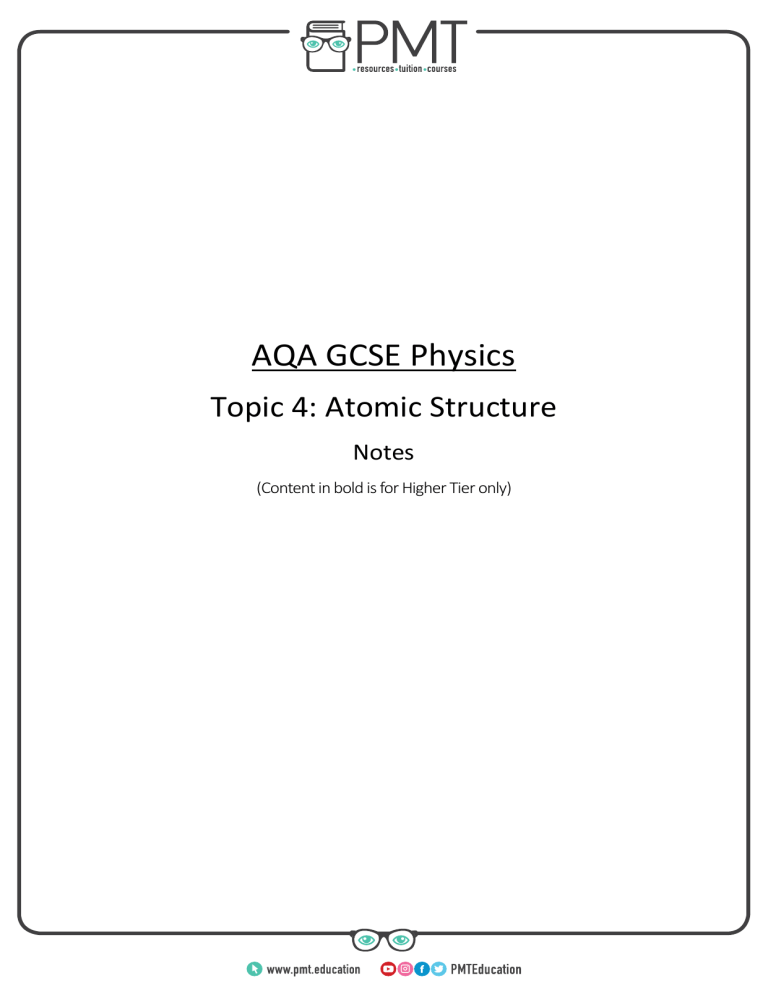
AQA GCSE Physics Topic 4: Atomic Structure Notes (Content in bold is for Higher Tier only) www.pmt.education Atomic Structure Positively charged nucleus (which contains neutrons and protons) surrounded by negatively charged electrons. Subatomic Particle Proton Neutron Electron Relative Mass 1 1 0 (0.0005) Relative Charge +1 0 -1 Typical radius of an atom: 1 × 10−10 metres - And the radius of the nucleus is 10 000 times smaller - Most (nearly all) the mass of the atom is concentrated at the nucleus Electron Arrangement: - Electrons lie at different distances from the nucleus (different energy levels). The electron arrangements may change with the interaction with EM radiation. Isotopes and Elements - All atoms of the same element have the same number of protons Neutral atoms have the same number of electrons and protons Isotopes are atoms of the same element, but with different masses, which have the same number of protons but different number of neutrons. For example Carbon-12, Carbon-13 and Carbon-14 𝐴𝐴 ±𝑛𝑛 𝑍𝑍𝑋𝑋 X is the letter of their element A is the mass number (number of neutrons and protons) Z is the proton number N is the charge o On a normal neutral atom, electrons = protons, so cancels out o If N more electrons than protons, then –N charge o If N fewer electrons than protons, then +N charge o The number of protons does not change for a certain element Atoms and EM Radiation - - When electrons change orbit (move closer or further from the nucleus) o When electrons move to a higher orbit (further from the nucleus) The atom has absorbed EM radiation o When the electrons falls to a lower orbit (closer to the nucleus) The atoms has emitted EM radiation If an electron gains enough energy, it can leave the atom to form a positive ion. www.pmt.education How and why the atomic model has changed over time 1800 - Dalton said everything was made of tiny spheres (atoms) that could not be divided 1897 - JJ Thomson discovered the electron The Plum Pudding Model was formed The overall charge of an atom is neutral, so the negative electrons were dispersed through the positive “pudding” to cancel out the charges. 1911 - Rutherford realised most of the atom was empty space Gold Foil Experiment Most 𝛼𝛼 particles went straight through - So most of atom is empty space Some 𝛼𝛼 particles were slightly deflected - So nucleus must be charged, deflecting positive 𝛼𝛼 Few 𝛼𝛼 particles were deflected by >90° - So nucleus contained most of the mass kcmcgann.tripod.com/goldfoil.jpg This experiment was carried out by Geiger and Marsden, specifics not needed 1913 - Rutherford Model Now there is a positive nucleus at the centre of the atom, and negative electrons existing in a cloud around the nucleus upload.wikimedia.org www.pmt.education 1913 – Bohr produced the final model of the atom If Rutherford was right, the electrons in the cloud close to the nucleus would get attracted, and cause the atom to collapse. So now the electrons exist in fixed ‘orbitals’ Later on: - Positive charge of nucleus could be subdivided into smaller particles, each with the same amount of charge – the proton - 20 years after the ‘nucleus’ was an accepted scientific idea, James Chadwick provided evidence to prove neutrons existed (don’t need specifics) Radiation Some atomic nuclei are unstable. The nucleus gives out radiation as it changes to become more stable. This is a random process called radioactive decay. Activity is the rate at which a source of unstable nuclei decays - So a sample with high activity has a fast rate of decay - Measured in Becquerel, Bq Count-rate is the number of decays recorded by a detector per second. - E.g. a Geiger-Muller Tube - Forms of decay o Alpha α (a helium nucleus) Highly ionising Weakly penetrating (~5cm of air) o Beta Minus β (electron) Medium ionising Medium penetration (~50cm of air, sheet of paper) Nuclear Equations Nuclear equations are used to represent radioactive decay. 𝐴𝐴𝐴𝐴𝐴𝐴ℎ𝑎𝑎 𝑃𝑃𝑃𝑃𝑃𝑃𝑃𝑃𝑃𝑃𝑃𝑃𝑃𝑃𝑃𝑃: 42𝐻𝐻𝐻𝐻 𝐵𝐵𝐵𝐵𝐵𝐵𝐵𝐵 𝑃𝑃𝑃𝑃𝑃𝑃𝑃𝑃𝑃𝑃𝑃𝑃𝑃𝑃𝑃𝑃: −10𝑒𝑒 www.pmt.education o o Gamma γ (radiation) Low ionising Highly penetration (very far in air, few cm of lead) Neutrons The emission of the different types of nuclear radiation may cause a change in the mass and /or the charge of the nucleus. Alpha Decay: 𝐴𝐴 𝑍𝑍𝑋𝑋 → 𝐴𝐴−4 𝑍𝑍−2𝑌𝑌 + 42𝐻𝐻𝐻𝐻 𝐴𝐴 𝑍𝑍𝑋𝑋 → 𝐴𝐴 𝑍𝑍+1𝑌𝑌 + −10𝑒𝑒 So alpha decay causes both the mass and charge of the nucleus to decrease Beta Decay: So beta decay does not cause the mass of the nucleus to change but does cause the charge of the nucleus to increase. Gamma Decay: Does not cause the mass or charge to change. Half Life - - - The half-life of an isotope is the time taken for half the nuclei in a sample to decay or the time taken for the activity or count rate of a sample to decay by half. It cannot be predicted when any one nucleus will decay, but the half-life is a constant that enables the activity of a very large number of nuclei to be predicted during the decay. So if 80 atoms falls to 20 over 10mins, the half-life? o 80/2 = 40 o 40/2 = 20 – so two half lives in 10mins So half-life is 5mins A short half-life o The source presents less of a risk, as it does not remain strongly radioactive o This means initially it is very radioactive, but quickly dies down o So presents less of a long-term risk Long half-life o The source remains weakly radioactive for a long period of time o Americium has a half-life of 432 years It is an alpha emitter, and used in smoke alarms It is emitted into the air around the alarm, and does not reach far because alpha is weakly penetrating If smoke reaches the alarm, the amount of alpha particles in the surrounding air drops This causes the alarm to sound o It is suitable because it will not need to The number of atoms over time tends to 0. be replenished, and its weak activity means it won’t be harmful to anyone. www.pmt.education Net Decline - Calculate the ratio of net decline of radioactive nuclei after X half-lives o Half the initial number of nuclei, and keep doing so X number of times o 𝐍𝐍𝐞𝐞𝐞𝐞 𝐃𝐃𝐞𝐞𝐞𝐞𝐞𝐞𝐞𝐞𝐞𝐞𝐞𝐞 = 𝐢𝐢𝐢𝐢𝐢𝐢𝐢𝐢𝐢𝐢𝐢𝐢𝐢𝐢 𝐧𝐧𝐧𝐧𝐧𝐧𝐧𝐧𝐧𝐧𝐧𝐧 − 𝐧𝐧𝐧𝐧𝐧𝐧𝐧𝐧𝐧𝐧𝐧𝐧 𝐚𝐚𝐚𝐚𝐚𝐚𝐚𝐚𝐚𝐚 𝐗𝐗 𝐡𝐡𝐡𝐡𝐡𝐡𝐡𝐡 𝐥𝐥𝐥𝐥𝐥𝐥𝐥𝐥𝐥𝐥 𝐢𝐢𝐢𝐢𝐢𝐢𝐢𝐢𝐢𝐢𝐢𝐢𝐢𝐢 𝐧𝐧𝐧𝐧𝐧𝐧𝐧𝐧𝐧𝐧𝐧𝐧 Contamination - - Contamination o Lasts for a long period of time o The source of the radiation is transferred to an object Radioactive contamination is the unwanted presence of radioactive atoms on other materials – the hazard is the decaying of the contaminated atoms releasing radiation o E.g. radioactive dust settling on your skin (your skin becomes contaminated) Irradiation o Lasts only for a short period of time o The source emits radiation, which reaches the object Exposing an object to nuclear radiation, but does not make it radioactive o E.g. radioactive dust emitting beta radiation, which “irradiates” your skin o Medical items are irradiated sometimes to kill bacteria on its surface, but not to make the medical tools themselves radioactive Scientific Reports Published need to be peer reviewed - If they are on the effects of radiation on humans, peer review is essential o If initial studies got measurements wrong, safety levels based on the study may cause people to die. Background Radiation (Physics only) - - Weak radiation that can be detected from natural / external sources o Cosmic rays o Radiation from underground rocks o Nuclear fallout o Medical rays The level of background radiation and radiation dose may be affected by occupation and/or location. Measurement of Radiation Dose, Sieverts (Sv). Uses (Physics only) - Tracers o Technetium is used as a medical tracer Half-life of 6hrs Decays into a safe isotope that can be excreted by the body It is injected/swallowed and there is enough time for it flow through the body and be detected before it decays away but is only present for a short enough time to minimise any harm from radiation. It is a gamma emitter, so can pass through the body tissue without being absorbed (as it is the most penetrating) www.pmt.education - Chemotherapy o Gamma emitters are used to emit gamma rays, which are directed onto certain areas of the body with cancerous cells, which absorb the energy and die, controlling the disease o It is used to control any other unwanted tissue too o However, as it is hard to direct accurately, surrounding healthy cells may also be irradiated, and their destruction causes unhealthy side effects Nuclear Fission (Physics only) - - Nuclear fission is the splitting of a large and unstable nucleus (eg uranium or plutonium). Spontaneous fission is rare. Usually, for fission to occur the unstable nucleus must first absorb a neutron. When the unstable nuclei absorbs a neutron it splits into two smaller nuclei, roughly equal in size and it then emits two or three neutrons and gamma rays. Energy is released by the fission reaction. This neutron may collide with another radioactive nucleus. This nucleus absorbs the neutron and becomes unstable This nucleus splits, releasing another neutron and produces more energy This is a chain reaction, as energy is being released and one ‘split’ causes another to occur o A neutron needs to be absorbed initially before it splits, because it needs a little extra energy before it can split and release lots of energy – like a ramp on a cliff, the neutron gives it enough of a kick to get over the ramp to fall After the nucleus splits, it leaves two smaller nuclei roughly equal in size And they both (along with the neutrons) have kinetic energy If the chain reaction is not controlled, it will increase at an exponential rate – which is what happens in a nuclear weapon This process is used in nuclear fission, with uranium nuclei Nuclear Fusion (Physics only) - This is when two small nuclei fuse to form a heavier nucleus, releasing (lots of) energy The sum of the masses of the two nuclei is more than the mass of the heavier nucleus Some of the mass is converted into energy. (released as radiation) The sun is a natural fusion reactor. Fusion would be a much more efficient way of producing energy compared to fission however no design has been produced that could accomplish positive net energy on earth. www.pmt.education
